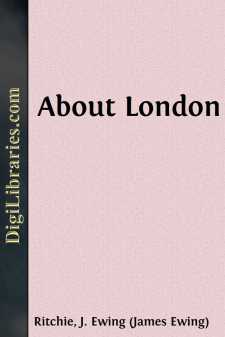Categories
- Antiques & Collectibles 13
- Architecture 36
- Art 48
- Bibles 22
- Biography & Autobiography 813
- Body, Mind & Spirit 142
- Business & Economics 28
- Children's Books 15
- Children's Fiction 12
- Computers 4
- Cooking 94
- Crafts & Hobbies 4
- Drama 346
- Education 46
- Family & Relationships 57
- Fiction 11828
- Games 19
- Gardening 17
- Health & Fitness 34
- History 1377
- House & Home 1
- Humor 147
- Juvenile Fiction 1873
- Juvenile Nonfiction 202
- Language Arts & Disciplines 88
- Law 16
- Literary Collections 686
- Literary Criticism 179
- Mathematics 13
- Medical 41
- Music 40
- Nature 179
- Non-Classifiable 1768
- Performing Arts 7
- Periodicals 1453
- Philosophy 64
- Photography 2
- Poetry 896
- Political Science 203
- Psychology 42
- Reference 154
- Religion 513
- Science 126
- Self-Help 84
- Social Science 81
- Sports & Recreation 34
- Study Aids 3
- Technology & Engineering 59
- Transportation 23
- Travel 463
- True Crime 29
About London
Description:
Excerpt
CHAPTER I.
NEWSPAPER PEOPLE.
What would the Englishman do without his newspaper I cannot imagine. The sun might just as well refuse to shine, as the press refuse to turn out its myriads of newspapers. Conversation would cease at once. Brown, with his morning paper in his hand, has very decided opinions indeed,—can tell you what the French Emperor is about,—what the Pope will be compelled to do,—what is the aim of Sardinia,—and what is Austria’s little game. I dined at Jenkins’s yesterday, and for three hours over the wine I was compelled to listen to what I had read in that morning’s Times. The worst of it was, that when I joined the ladies I was no better off, as the dear creatures were full of the particulars of the grand Rifle Ball. When I travel by the rail, I am gratified with details of divorce cases—of terrible accidents—of dreadful shipwrecks—of atrocious murders—of ingenious swindling, all brought to light by means of the press. What people could have found to talk about before the invention of newspapers, is beyond my limited comprehension. They must have been a dull set in those dark days; I suppose the farmers and country gentlemen talked of bullocks, and tradespeople about trade; the ladies about fashions, and cookery, and the plague of bad servants. We are wonderfully smarter now, and shine, though it be with a borrowed light.
A daily newspaper is, to a man of my way of thinking, one of the most wonderful phenomena of these latter days. It is a crown of glory to our land. It is true, in some quarters, a contrary opinion is held. “The press,” Mr. David Urquhart very seriously tells us, “is an invention for the development of original sin.” In the opinion of that amiable cynic, the late Mr. Henry Drummond, a newspaper is but a medium for the circulation of gossip; but, in spite of individuals, the general fact remains that the press is not merely a wonderful organization, but an enormous power in any land—in ours most of all, where public opinion rules more or less directly. Our army in the Crimea was saved by the Times. When the Times turned, free-trade was carried. The Times not long since made a panic, and securities became in some cases utterly unsaleable, and some seventy stockbrokers were ruined. The Times says we don’t want a Reform Bill, and Lord John can scarce drag his measure through the Commons. But it is not of the power, but of the organization of the press I would speak. According to geologists, ages passed away before this earth of ours became fit for human habitation; volcanic agencies were previously to be in action—plants and animals, that exist not now, were to be born, and live, and die—tropical climates were to become temperate, and oceans, solid land. In a similar way, the newspaper is the result of agencies and antecedents almost equally wondrous and remote. For ages have science, and nature, and man been preparing its way. Society had to become intellectual—letters had to be invented—types had to be formed—paper had to be substituted for papyrus—the printing-press had to become wedded to steam—the electric-telegraph had to be discovered, and the problem of liberty had to be solved, in a manner more or less satisfactory, before a newspaper, as we understand the word, could be; and that we have the fruit of all this laid on our breakfast-table every morning, for at the most five-pence, and at the least one-penny, is wonderful indeed. But, instead of dwelling on manifest truisms, let us think awhile of a newspaper-office, and those who do business there. Externally, there is nothing remarkable in a newspaper-office. You pass by at night, and see many windows lighted with gas, that is all. By daylight there is nothing to attract curiosity, indeed, in the early part of the day, there is little going on at a newspaper-office. When you and I are hard at work, newspaper people are enjoying their night; when you and I are asleep, they are hard at work for us. They have a hot-house appearance, and are rarely octogenarians. The conscientious editor of a daily newspaper can never be free from anxiety. He has enough to do to keep all to their post; he must see that the leader-writers are all up to the mark—that the reporters do their duty—that the literary critic, and the theatrical critic, and the musical critic, and the city correspondent, and the special reporter, and the host of nameless contributors, do not disappoint or deceive the public, and that every day the daily sheet shall have something in it to excite, or inform, or improve. But while you and I are standing outside, the editor, in some remote suburb, is, it may be, dreaming of pleasanter things than politics and papers. One man, however, is on the premises, and that is the manager. He represents the proprietors, and is, in his sphere, as great a man as the editor. It is well to be deferential to the manager. He is a wonder in his way,—literary man, yet man of business. He must know everybody, be able at a moment’s notice to pick the right man out, and send him, it may be, to the Antipodes. Of all events that are to come off in the course of the year, unexpected or the reverse, he must have a clear and distinct perception, that he may have eye-witnesses there for the benefit of the British public. He, too, must contrive, so that out-goings shall not exceed receipts, and that the paper pays. He must be active, wide-awake, possessed of considerable tact, and if, when an Irish gentleman, with a big stick, calls and asks to see the editor or manager, he knows how to knock a man down, so much the better. Of course, managers are not required for the smaller weeklies. In some of the offices there is very little subdivision of labour. The editor writes the leaders and reviews, and the sub-editor does the paste-and-scissors work. But let us return to the daily paper;—outside of the office of which we have been so rude as to leave the reader standing all this while....









